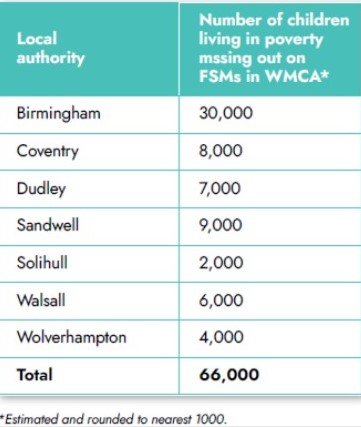13 November 2023
Report reveals 66,000 children in poverty in West Midlands have no access to Free School Meals

New report reveals 66,000 children in the West Midlands Combined Authority are living in poverty but have no access to Free School Meals
A new report, published today, has revealed that around 66,000 children in the West Midlands Combined Authority are living in poverty with no access to Free School Meals (FSMs), and 110,000 across the whole of the West Midlands.
The Food Foundation, the independent charity that published the report, is calling on local leaders to extend access to Free School Meals by setting up a free school meals pilot in the area to ensure local children aren’t going hungry.

Across England, from Year 3 onwards only children from households on certain benefits and earning less than £7,400 (not including benefits and after taxes) receive a FSM. This figure has not changed since 2018, despite rising inflation and the continuing impact of the cost-of-living crisis.
The FSM criteria in England are the least generous across the UK nations, and are increasingly divergent from Wales and Scotland (where universal provision across all primary schools is being rolled out) and Northern Ireland (where eligibility is set at £14,000 – double the level in England).
In the absence of action by National Government to increase eligibility criteria, many local authorities in England are now taking matters into their own hands.
All London state primary school children are now eligible for FSMs as of this September for one year through emergency funding provided by the London Mayor Sadiq Khan. Other local areas are also working to extend access, with pilots being set up from York to Stockport.
Whilst this is good news for the young people living in these areas, it also establishes a postcode lottery that exacerbates regional inequalities, with schoolchildren in other areas not having access to the same benefits and life chances.
The Food Foundation’s report provides information and data analysed with support from Child Poverty Action Group, that local policy makers in the West Midlands can use to set up their own pilot to extend eligibility for FSMs, protecting the most vulnerable children in the area and increasing pressure on national government to extend access at national level.
The report details the benefits of extending access to Free School Meals, with children found to be healthier and happier, able to do better in school and in the long-term, earn more over their lifetime.
The prevalence of Reception-aged children living with obesity in 2022/3 was highest in the West Midlands (10.1%) and the North East (11.3%) and the North West (10.1%). It was lowest in the South East (8.0%), South West (8.2%) and East of England (8.1%).
For Year 6, the prevalence of children living with obesity was again highest in the West Midlands (25.2%), the North East (25.8%) and London (24.8%). It was lowest for Year 6 children in the South West (19.3%), the South East (19.4%) and the East of England (20.6%)(1).
There is evidence that Universal FSMs can help to reduce overweight and obesity. Evidence from four London boroughs showed that the prevalence of obesity was reduced by 9.3% among children in Reception and 5.6% among Year 6 children who received UFSMs(2).
This effect seems to be cumulative – in other words, the more years that FSMs are available to children at school, the greater the impact on obesity.
Research has also shown that FSMs are healthier than most packed lunches. Children who have school meals eat more fruit and vegetables – and only 1.6% of packed lunches meet the government’s School Food Standards(3).
A previous study commissioned by Impact on Urban Health, published in 2022, showed that if FSMs were extended to all children, for every £1 invested, £1.71 would be generated in core benefits driven by improved health, education and employment outcomes. If the policy was expanded to all children from households on Universal Credit, for every £1 invested, £1.38 would be returned(4).
Shona Goudie, Policy and Advocacy Manager, at The Food Foundation, said: "Healthy, tasty, free meals at school help pupils to concentrate and learn and for many of our children and young people, Free School Meals may be their main source of hot, nutritious food.
"Every child in England should have an equal opportunity to learn and to be healthy, no matter where they grow up, so the Government should extend Free School Meals to more children across the country.
"But, in the absence of Government action, we are calling on local leaders in the West Midlands to step in and use the information in our report to set up and run a Free School Meals pilot to support young people in the area."
Matthew Knight, Catering Manager at Hillstone Primary School in Birmingham, said: "The need for all children in primary school to receive a hot nutritious meal at lunch time has never been greater.
"The moral argument that we have a duty as a society to nourish our future and invest in young people should be enough.
"On top of this, research consistently indicates that children in parts of the country lucky enough to have been receiving FSMs get better exam results and ultimately go on to earn a higher salary.
"Surely, we can think of a way to make sure our young people are fed, just as they have in London."
FOOTNOTES
2) For full results and methodology, see MiSoC Explainer: Holford, A. and Rabe, B., 2022, Impacts of Local Authority Universal Free School Meal schemes on Child Obesity and Household Food Expenditure https://doi.org/10.5526/misoc-2022-003
3) Evans, C.E.L., et al., 2020. A repeated cross-sectional survey assessing changes in diet and nutrient quality of English primary school children’s packed lunches between 2006 and 2016. BMJ Open 10, e029688. https://doi.org/10.1136/bmjopen-2019-029688
4) Impact on Urban Health, 2022. Investing in Children’s Future: A Cost Benefit Analysis of Free School Meal Provision Expansion. https://urbanhealth.org.uk/insights/reports/expanding-free-school-meals…;
NOTES TO EDITORS
Please contact: Juliet Grant on 07929 075489 or email juliet.grant@foodfoundation.org.uk
AVAILABLE FOR INTERVIEW
Shona Goudie, Policy and Advocacy Manager, The Food Foundation
SOCIAL MEDIA
Twitter: @Food_Foundation
Instagram: food.foundation
The Food Foundation Podcast
For more in-depth analysis and lived experience listen to our podcast
About the Food Foundation
The Food Foundation is a charity working to influence food policy and business practice, shaping a sustainable food system which makes healthy diets affordable and accessible for all. We work in partnership with researchers, campaigners, community bodies, industry, investors, government and citizens to galvanise the UK’s diverse agents of change, using surprising and inventive ideas to drive fundamental shifts in our food system. These efforts are based on the continual re-evaluation of opportunities for action, building and synthesising strong evidence, convening powerful coalitions, harnessing citizens’ voices and delivering impactful communications.
Registered Charity Number 1187611.
The report was funded by The Nuffield Foundation and Impact on Urban Health
About The Nuffield Foundation
The Nuffield Foundation is an independent charitable trust with a mission to advance social well-being. It funds research that informs social policy, primarily in education, welfare and justice. The Nuffield Foundation is the founder and co-funder of the Nuffield Council on Bioethics, the Ada Lovelace Institute and the Nuffield Family Justice Observatory. The Foundation has funded this project, but the views expressed are those of the authors and not necessarily the Foundation.
About Impact on Urban Health
Impact on Urban Health is a part of Guy’s & St Thomas’ Foundation, and is committed to achieving health equity by helping urban areas become healthier places for everyone to live.


